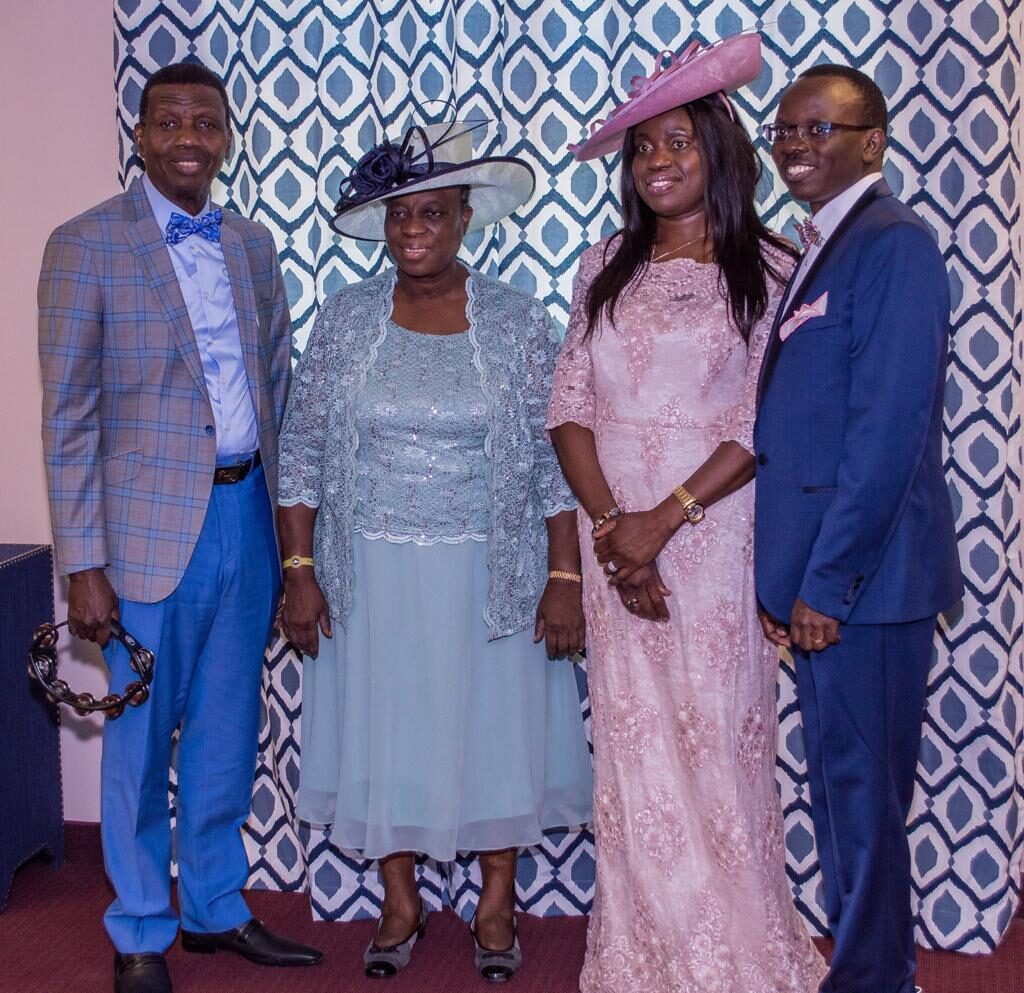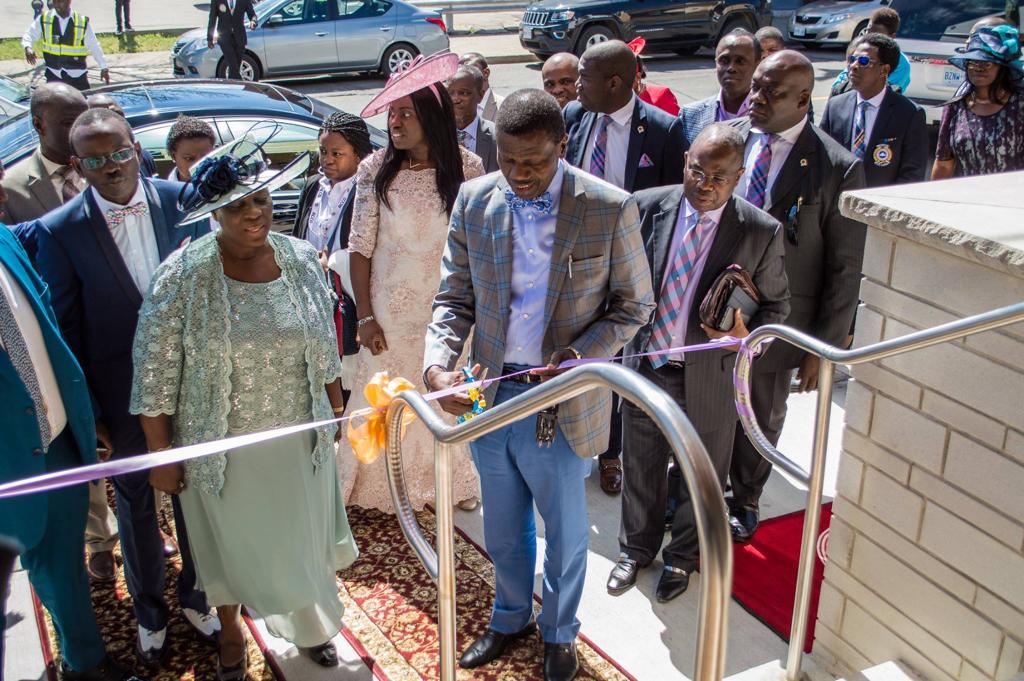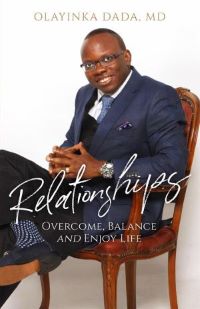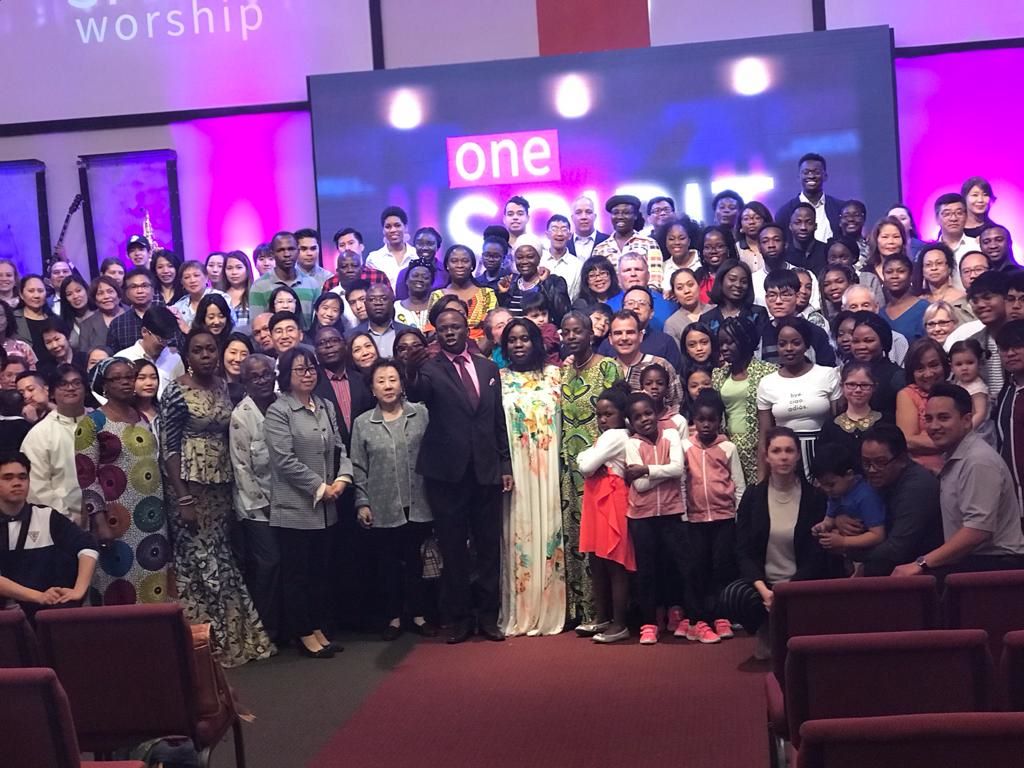Dr. Olayinka Dada is a Regional Pastor and Assistant Continental Overseer in the Redeemed Christian Church of God, The Americas Continent. He is a pastor, physician, author, and mentor to many. He studied medicine at University of Ilorin, worked for a couple of years before leaving Nigeria. So far, he has practiced medicine and pastored RCCG parishes along with his wife, Oluwatoyin in Swaziland, South Africa and now Canada.
His kingdom work has been marked by grace, servant leadership, and total commitment for more than twenty-five years.
In this second part of the interview with Church Times Nigeria, Dr. Dada gives a picture of his service in God’s vineyard. Follow this link for the first part of the interview: https://churchtimesnigeria.net/swaziland-south-africa-olayinka-dada/
Find below excerpts from the second part:

Pastor Enoch Adeboye, hIs wife Folu and Pastor Oluwatoyin Dada and her husband Pastor Yinka Dada in Canada
You talked about racism in South Africa in our previous interview. What is your experience in Canada as regards racism?
There is racism in Canada too but it is not done openly. It is subtle. But then, there are some daring Canadians that will confront you and say some demeaning things to you since your colour is obvious and your accent gives you away. So they easily know you and relate with you accordingly. But one way or the other you learn patience through the experience.
But how was your first few years in Canada? You said you were in Newfoundland?
Yes. That was the first place we stayed in Canada. Newfoundland is the extreme eastern part of Canada. It’s like Akwa Ibom to Lagos. It’s a coastal province. In terms of development and modernization, Newfoundland is 10 years behind the rest of Canada. But then, I worked in the northern part of Newfoundland, which is also 10 years behind the rest of Newfoundland. The weather there is a bit harsh in terms of its coldness. The people can be nice but their niceness is not deep. They too have developed a kind of psychology not to get too close to people because they see people come and go.
The place is serene, peaceful, and largely secure. You could leave your car unlocked and doors open and nothing will happen. So generally, there was peace when we were there. We were there for two and half years before we moved to Ontario which is like Lagos. Ontario has 40 percent of the population of Canada. The population of the whole province of Newfoundland is about 500,000 but the city where we are now for the past 17 years is also 500,000. We also have 18 to 20 percent black people in the city where we live. But in the whole of Canada, the population of black people is just about six percent.

Commissioning of the RCCG Restoration House in Ontario, Canada by Pastor Enoch and Pastor Mrs. Folu Adeboye
Did you start a church in Newfoundland?
No. We were part of the Pentecostal Assemblies of Newfoundland. I used to preach in the church. We were not decisive on whether to start another RCCG church in Newfoundland that was why we joined the Pentecostal Assemblies. But then, we had this relationship with our General Overseer, Pastor Enoch Adeboye, and his wife when we were in Swaziland and South Africa. They saw some things in us. They saw the passion and commitment to the RCCG mission. So, when we got to Canada and we were praying about what to do, Pastor Mrs. Folu Adeboye, our mummy G.O. had given our number to some of the RCCG leaders to encourage us to start a mission here.
By the time we moved to Hamilton Ontario from Newfoundland, we found out that there was no church planted by RCCG there. That motivated us to start RCCG parish there. We moved into the place on Oct 7 of that year and started the RCCG parish on November 16. Before then, one of the few RCCG churches had invited us to Windsor, Ontario to come and take over the church because the Nigerian pastor was coming back to Nigeria. But the arrangement didn’t work. I was on the plane from Windsor to Toronto when God told me to move to Hamilton where we first began the church. But it’s interesting now that almost all the churches of RCCG in Canada are under us since we are one of the regional headquarters
So how was it like starting a church in Ontario?
There is a big difference in terms of the environment. Only about 4500 people were living in the community where we stayed in Newfoundland while the capital of Newfoundland had just about 130,000 people. But the population in Hamilton Ontario like I said is about 500,000. That is huge. Our church is a megachurch. In Hamilton alone, we have six parishes that came from our own parish. We started what we call the restoration house family. Anywhere you see any RCCG parish with the name restoration in Canada, it can be traced to us. We got the concept from the Jesus House family which is also in RCCG.
You have established so many parishes in Canada and even in South Africa. How easy is it for you to start a church there?
It’s not been easy. There are many people that have not started a church. You need to have a passion for it and the grace to do it. Like I told you, I am connected to our leader Pastor Adeboye. I have a son–father relationship with him. Maybe I tapped into that grace. It takes grace to start a church.
I have also realized that if you have a vision, God will always make a provision. You take one step, God will take two steps. But then it’s not been that smooth. I brought one brother from Africa to help with the church planting. Not long after he came, he started misbehaving and he did not want to align. He wanted to hold tight to one parish that he started. We called him to encourage him to move out of the parish and start another. He said he suffered for the parish to get to where it was. He was holding tight to the church. I have discovered that some people just want to keep the little they have. And that is not helping church growth.
So how have you been running church in Canada?
We try to combine spirituality with organisation to make the work easy. During this covid–19 I started what I call a PYD (Pastor Yinka Dada) mentoring class. I love leadership, excellence, and organisation. Anywhere I see chaos or disorganisation, it irritates me. I love seeing people do things well. Whatever is worth doing is worth doing well, I want excellence. That is what I am passing on to others.
When God gave us vision, we knew our church is not a Nigerian church. We took our inspiration from Isaiah 2v2: Mountains of the Lord’s House shall be exalted above other mountains and people of all nations will flow into it. Our church is a multicultural multi–ethnic church. It is not a Nigerian church. You cant go and be speaking languages that are not generic on the pulpit. If you want to climb our podium you must do things well. I teach a lot of ethics so that people will know that anything worth doing is worth doing well. I believe in training, learning, and unlearning. A lot of people come with all kinds of mentality from Africa. We have to make sure they unlearn those things.
One pastor from Nigeria came to our church. He was asking why we don’t have some departments in the church. He came with the Nigerian mentality. I sent him to a nearby town to pastor a church when I realised he was restless. When he started pastoring, he discovered it was not a Nigerian field. The members of the church he was pastoring literally chased him out. His style was odd. He was not open to change. He is now back in Nigeria. He could not cope. He could not change his orientation. His first impression was bad. He felt we didn’t know what we were doing. But he saw the reality after some time of his pastoring. That is the mistake many of our pastors make. They don’t really bridge the cultural gap.
But how did you get to train yourself to get to where you are today?
I learnt a lot while in Newfoundland. When I was leaving the place, the pastor there wanted me to come and preach every six weeks so that we don’t go away completely from the church. But I had other plans as God was leading me. I learnt organisation in Newfoundland. In terms of organisation, they were top-notch. In terms of spirituality, we are top-notch. But some African pastors are not organised. But when you see a pastor who combines organization with spiritual fervency the result is always great.
It was in Newfoundland I learned from the youth pastor the idea of typing my sermons and filing them away for easy reference and in case I want to refer to it again. The youth pastor of the church in Newfoundland showed me sermons he had preached years back. They were all typed and printed and filed. From that day, I started typing my sermon. When I started reading autobiographies of pastors like Charles Finney and CH Spurgeon, I discovered that was what they were doing. I have never gone to the pulpit without typing my sermon since then.
I don’t preach without a power point. It makes life easy when you are organised. God has helped us to combine organisation with spirituality.
But how did you attract Canadian indigenes to your church?
Since I am a physician I get involved in every community I work. Majority of my patients are white, so it has been easy to impact them. When we were in Newfoundland I noticed the indigenes have a thicker accent. They were illiterates and were largely into fishing. I got quite close to them. I am immersed in people. Some may not be in church, but the impact is there. People who believe in what I do are drawn to us.
When we first started, about 60 percent of our members were white people. But as the church grew the white folks began to leave because they love small group fellowship. That is why some of the local churches in Canada are small. But they are big in missions. When we began to grow, the white folks felt pastor won’t have time for them again. In those days we moved around to houses and had fellowship with ourselves. But as the church was growing, they started withdrawing. Though the white folks still come, we now have people from different nationalities.
Restoration House and Charity work
What is the Church–government relationship in Canada?
Canada is a Christian nation although it is becoming a secular nation because of modernization. The government respects The Church and encourages churches to get involved with the community. They use churches to do a lot of Corporate Social Responsibility CSR.
Our church is big in that. For instance, we opened our church facilities for the government to administer the covid-19 vaccine. We had over 130 people they administered every day for many weeks/months. We distribute hamper, turkey during Thanksgiving Day and Christmas. The Canadian government has a strong welfare system. Health care is free here. But we still have people who still need help.
Other areas in which we contribute to the community are through our annual free tax clinic services and food bank. We are registered with Canada Revenue Agency (CRA) and have been a part of the Community Volunteer Income Tax Program (CVITP) for over ten years. God has helped us to reach many community members that express that unwavering excitement and gratitude annually.
The RHH foodbank also runs to serve the Hamilton population and has partnered with several provincial organizations to ensure that the hungry are fed. Our foodbank is also registered and it runs three times a week to ensure flexibility and access.
We were open throughout the pandemic and God helped us to serve and offer support to those in need. We also provide scholarships to high school, colleges, and university students in our community We are also actively involved in missions through African missions of RCCG pioneered by mommy GO. The Canadian government loves it when churches are involved in the welfare of the people.
Here we pay tax. There are two things you can’t escape in Canada, tax, and death when it comes. The government encourages people to give to the church. If you give to Church which is considered a charity organisation you will be given a tax relief. Any money gift to the church is tax-deductible. If you give 1000 dollars to the church for instance, the church will give you a receipt so when you are going to pay your tax the 1000 donation to the church will bring down your tax. If you go to the Canada Revenue Agency website you can see what each church makes a year. It’s an open system.
Government monitors the church’s finance very well, churches are also behaving well. That is what they are trying to do in Nigeria that people kicked against because they don’t understand how the system works. In Canada, because you want to enjoy your charity status you make sure your books are well kept. The government expects the church to spend the money in a certain way. The government loves it when you do a lot charity. In 2020 we gave out about 500 turkeys during Thanksgiving. During Christmas we gave about 200 hampers to the community we are located. The government loves to hear things like that.
Good. How then will you describe the relationship between RCCG in Canada and the headquarters in Nigeria?
The church is structured. Every parish outside the country is under Nigeria.
Do you send money back home from the church?
That is the other thing about the Church here. There is accountability. You cant just send money anyhow, otherwise, you will run into trouble. The Canada Revenue Agency keeps watch over our finance. They won’t allow you to take money out of the country. If you are going to spend money on mission, you have to apply to do that. You don’t just unilaterally decide to send money outside the country. Our General Overseer is careful about this. He wants to do things in line with the law. If you want to do missions, it must be supervised by the people in Canada.
You are a medical doctor and then a pastor. How do you combine these two?
It has been very tough to combine the two busy jobs. My wife has helped me greatly. I have a supportive wife who values the family. I wrote a book on my wife when she turned 50 to appreciate her. She is family-focused. God has been faithful. I am a family physician. I run schedules which are quite tight. You cant just pull me anyhow. God has helped me to balance family work and ministry. I don’t get paid for church work. It’s volunteer work. But its something I enjoy doing. And God has elevated us to a level in the church system.
Looking back to your conversion and your younger years, did you envisage all these?
I became born again early in life. I was always buried in my books from primary school. I had a covenant with God early in life that if I release myself to Him, He will do His own part of making me excel. There was a time when I was in the university and had a vision of seeing a hawker who shook her head to show an impending doom concerning me. We were preparing for exams afterward and I fell ill. I went to see my sister to share the dream with her and suddenly I went into coma. That was in real life. She began to wrestle in the spirit and was praying for me. She did not call anybody. But people got to know. They poured water on me and rushed me to the hospital. I woke up six hours later in the hospital. The only thing I remembered was when I was sharing my dream with my sister. So for me, God has been faithful. He has been positioning me, delivering me from all kinds of evil.
You have been to four countries. From your experience what best counsel will you give Nigerian pastors doing missions?
I will counsel them to bridge the cross-cultural gap in countries where they find themselves. They should never impose Nigerian culture anywhere they go. They should train the indigenes to take over in leadership. Encourage them and embrace them into leadership positions no matter their level. They should also invest money in missions.
And for the pastors in Nigeria?
We should have patience, tolerance, and humility. We need to find ways to break sycophancy in the church, there should be clear cut metrics for promotion and guideline for reward. We should embrace organisation while not throwing away our spirituality




1 comment
I met Pastor Yinka Dada for the first time in Madrid, Spain in September 2017. Below is his word when I asked him how he cope with his busy schedule. “God has helped me to balance family work and ministry”. I love his consistency, simplicity and deep spirituality.
More grace to you sir.